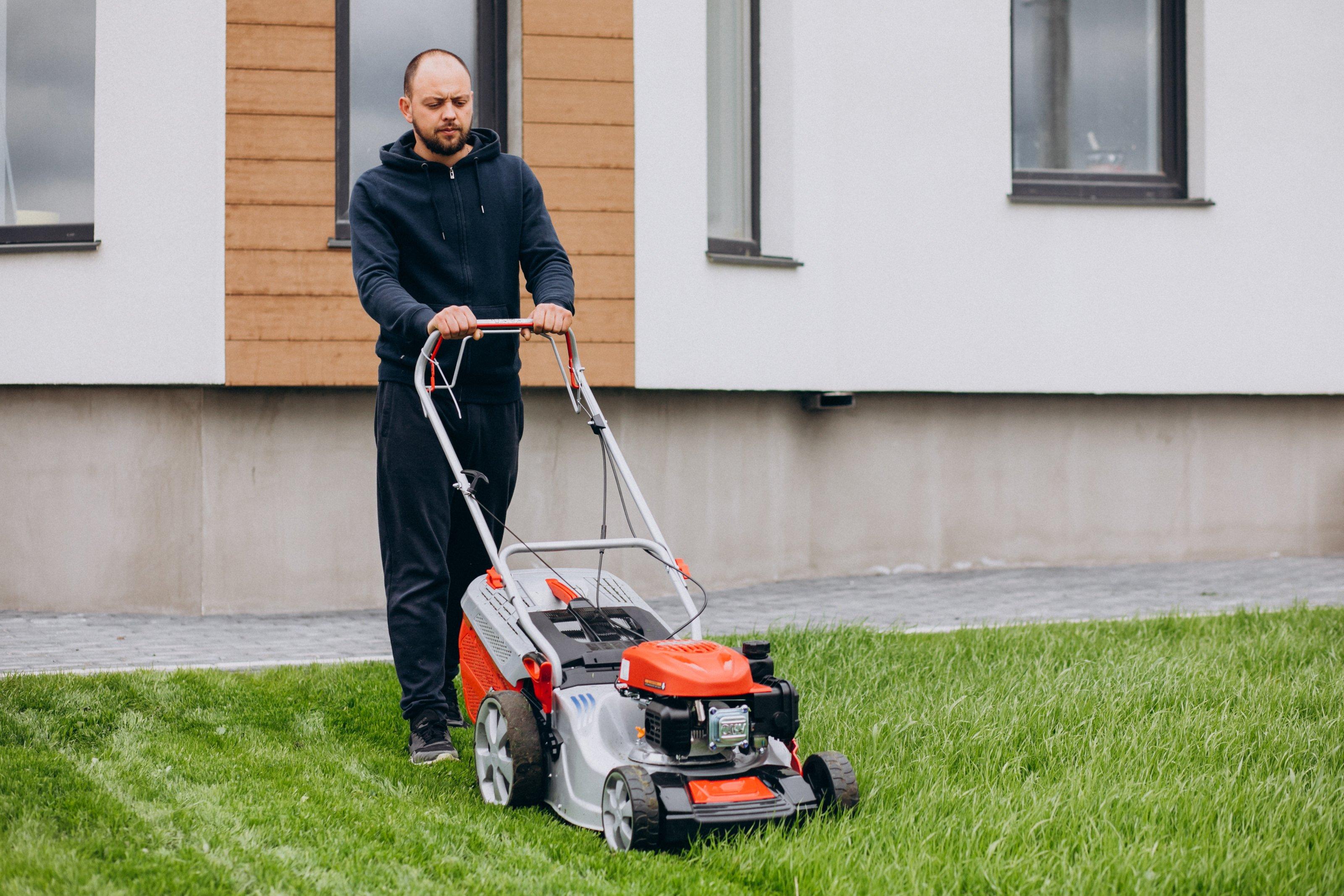How-To Guides
9 Lawn Mower Troubleshooting: Common Causes and How to Fix
AZparts Team
Updated on November 24, 2025
8 min read
Is your lawn mower refusing to start, stalling mid-job, or cutting unevenly? Don’t let frustration take over your weekend plans. Whether it’s a faulty spark plug, clogged filter, or dull blades, understanding what’s wrong is the first step toward a smooth-running machine. AZParts will guide you through quick and effective lawn mower troubleshooting solutions so you can fix common problems with confidence and keep your yard looking its best.
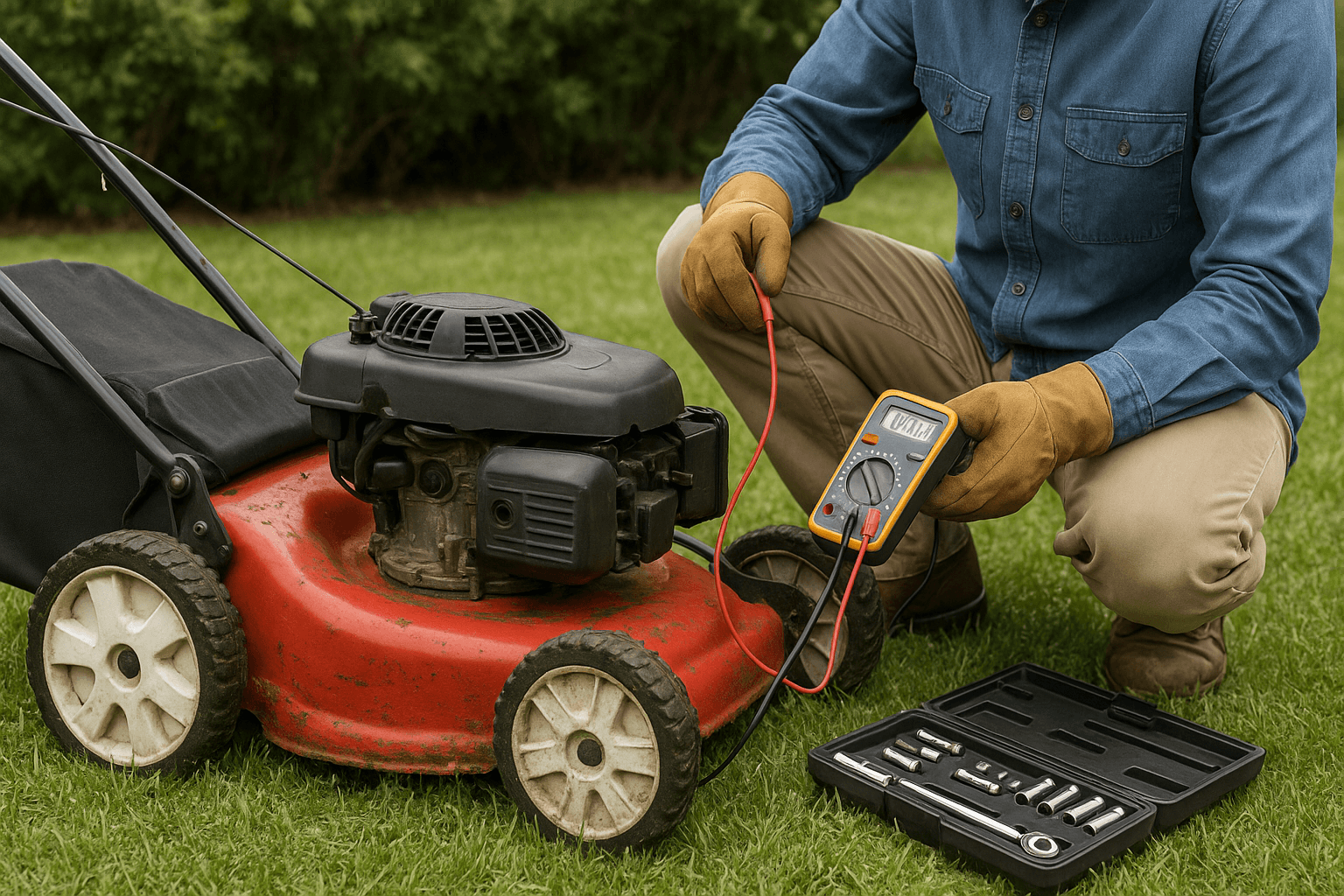
1. Lawn Mower Won’t Start
When your lawn mower won’t start, it can be frustrating and delay your yard work. Fortunately, most starting problems have simple causes that you can check and fix yourself. Below are common reasons why your mower might fail to start and how to troubleshoot them effectively.
- Out of fuel or old fuel: Check the tank and fill with fresh gasoline. Drain and replace fuel if it’s over 30 days old to avoid blockages.
- Dirty or faulty spark plug: Inspect and clean or replace the spark plug if worn or fouled. Ensure correct spark gap and tight installation.
- Clogged air filter: Replace or clean the air filter if dirty or oily to maintain proper airflow.
- Fuel not reaching engine: Check and clean or replace clogged fuel filter and fuel lines to ensure fuel flow.
- Dirty or blocked carburetor: Tap the carburetor to loosen blockage; if needed, remove and clean it with carburetor cleaner or replace it.
- Ignition switch malfunction: Test the ignition switch with a multimeter; replace if faulty to restore proper starting.
Read more: How to Clean A Snow Blower Carburetor
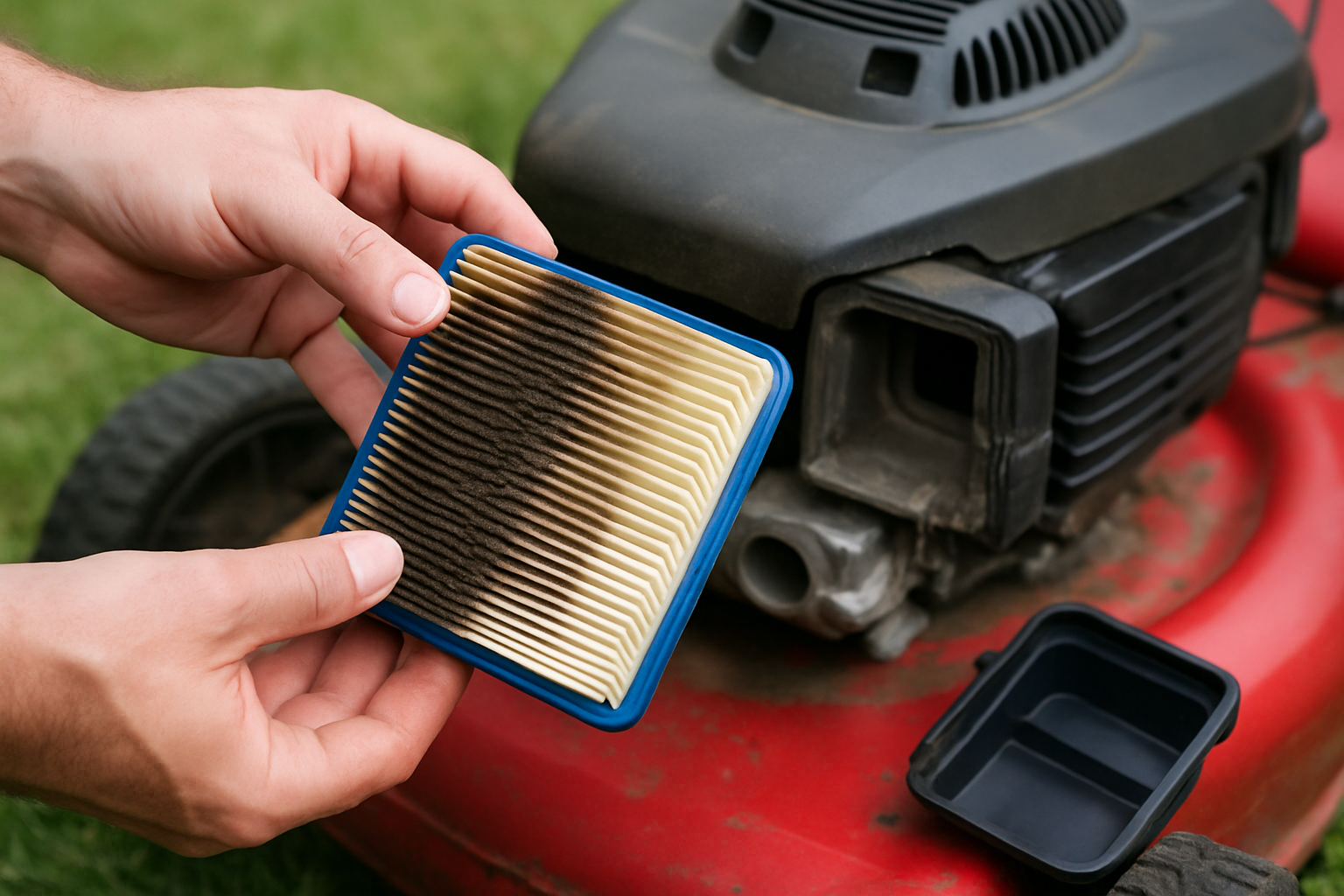
Clogged air filter can be a main cause lead to lawn mower not start (Source: AZParts)
2. Lawn Mower Starts Then Stops
If your lawn mower starts but then quickly stops, it’s a sign that something is interrupting the engine’s operation. This common issue often has straightforward causes that you can identify and fix to get your mower running smoothly again.
- Stale or contaminated fuel: Old or dirty fuel can cause the engine to stall shortly after starting. Drain the fuel tank and refill it with fresh gasoline. Also, avoid storing fuel for long periods to prevent contamination.
- Clogged carburetor: Dirt and residue can block fuel flow inside the carburetor. Try tapping the side of the carburetor gently to loosen any blockage. If that doesn’t work, remove and clean it thoroughly using carburetor cleaner spray. In severe cases, a carburetor rebuild or replacement may be necessary.
- Blocked fuel lines or fuel cap: Fuel lines or the vent in the fuel cap can get clogged, restricting fuel flow. Inspect the fuel lines for cracks or debris and clear any blockages. Make sure the fuel cap vent is not sealed shut, allowing proper airflow.
- Overheating engine: Continuous use or insufficient cooling can cause the engine to overheat and shut down. Let the mower cool before restarting. Regularly clean air filters and check oil levels to prevent overheating.
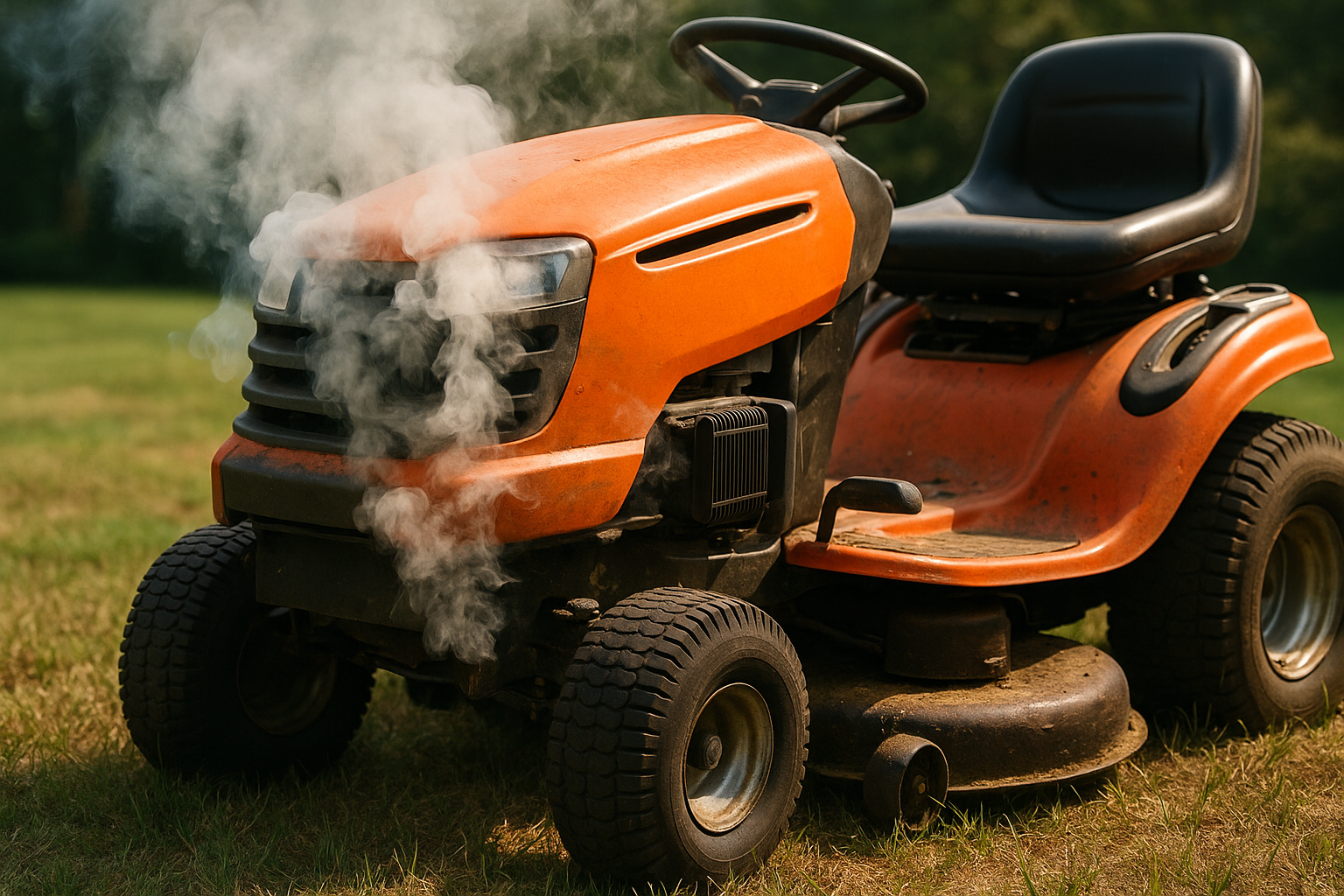
Overheating engine on the lawn mower (Source: AZParts)
3. Lawn Mower Vibrates Too Much
Excessive vibration while mowing can make your job uncomfortable and may signal mechanical issues. Identifying the cause early helps prevent further damage and keeps your mower running smoothly.
- Loose or damaged blade: A bent, dull, or unbalanced blade can cause excessive vibration. Inspect the blade, sharpen or replace it if needed, and make sure it’s securely tightened.
- Loose engine mounts or hardware: Check bolts and mounts holding the engine and mower deck. Tighten any loose parts to reduce vibration.
- Debris stuck under the deck: Grass clippings or debris buildup can throw the mower off balance. Clean the underside of the mower deck regularly.
- Worn or damaged belts: Worn belts can cause uneven operation and vibration. Inspect and replace belts if they show signs of wear or damage.
- Engine problems: Internal engine issues, such as misfiring or loose components, can also cause vibration. If other fixes don’t work, consider professional servicing.
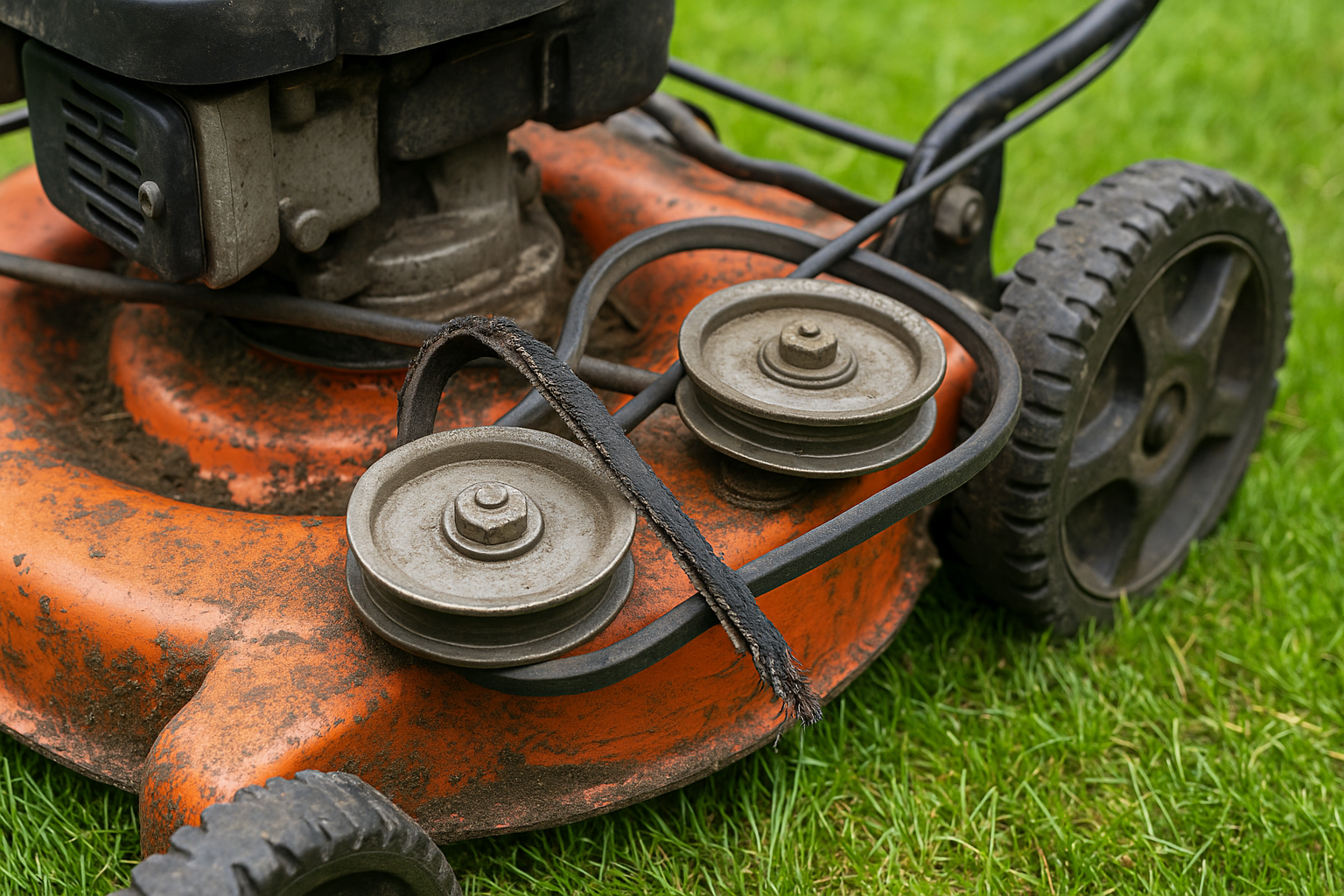
Worn or damaged belts can lead to uneven operation of lawn mower (Source: AZParts)
4. Lawn Mower Cuts Unevenly or Poorly
If your lawn mower is cutting unevenly or poorly, it can ruin the look of your lawn. Identifying the common causes will help you fix the problem quickly and get a clean, even cut every time.
- Dull or damaged blades: Blades that are dull, bent, or chipped won’t cut grass cleanly. Sharpen or replace the blades regularly for a smooth, even cut.
- Uneven mower deck: If the mower deck is tilted or damaged, it can cause uneven cutting. Check the deck level and adjust the height on both sides evenly.
- Incorrect cutting height: Setting the mower too low or too high can affect cut quality. Adjust the cutting height to suit your grass type and lawn condition.
- Clogged mower deck: Grass buildup under the deck can block blades and reduce cutting efficiency. Clean the underside of the mower after each use.
- Worn or loose parts: Loose blade bolts or worn mower components can cause uneven cutting. Inspect and tighten all parts regularly.
5. Lawn Mower Is Smoking
Seeing smoke from your lawn mower can be alarming. Knowing what causes it can help you address the lawn mower smoking before it leads to serious engine damage.
- Overfilled oil: Too much oil can cause smoke. Check and drain excess oil if needed.
- Burning grass or debris: Grass stuck on the engine or muffler can smoke when heated. Clean the mower thoroughly.
- Engine problems: Blue or white smoke may indicate engine oil burning due to worn piston rings or valve seals. This requires professional repair.
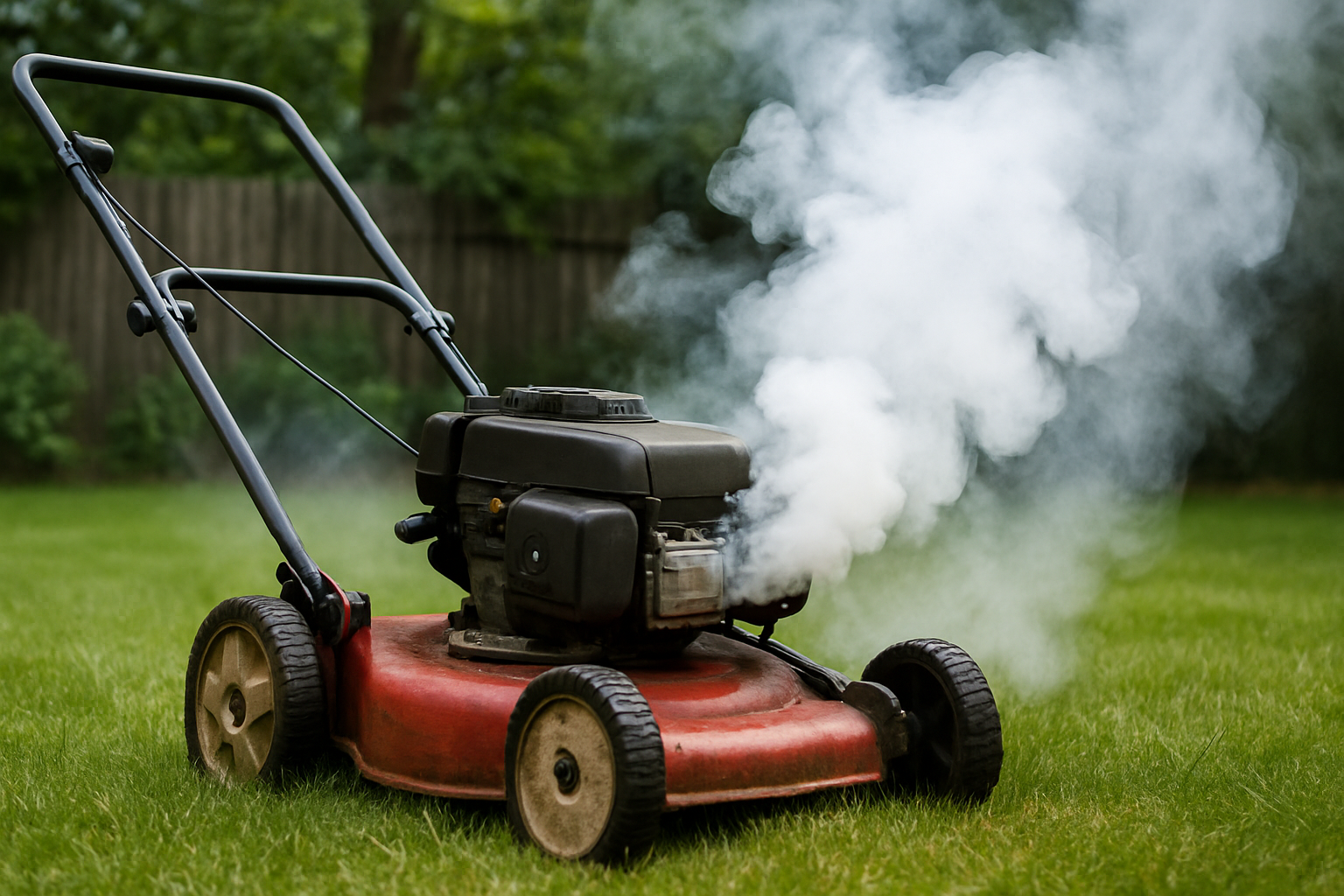
Smoking Issue Detected in Lawn Mower (Source: AZParts)
Seeing smoke from your lawn mower can be alarming. Knowing what causes it can help you address the issue before it leads to serious engine damage.
- Overfilled oil: Too much oil can cause smoke. Check and drain excess oil if needed.
- Burning grass or debris: Grass stuck on the engine or muffler can smoke when heated. Clean the mower thoroughly.
- Engine problems: Blue or white smoke may indicate engine oil burning due to worn piston rings or valve seals. This requires professional repair.
6. Lawn Mower Starter Rope Won’t Pull
If the starter rope won’t pull, your mower won’t start. Identifying why the rope is stuck or broken can get you back to mowing quickly.
- Rope is stuck or jammed: The rope may be caught inside the recoil starter. Remove the starter housing and check for obstructions.
- Broken or snapped rope: Replace the starter rope if it’s frayed or broken.
- Engine seized: If the engine won’t turn over, it may be seized or locked. Inspect and fix engine issues before pulling the rope.
7. Battery-Powered Lawn Mower Problems
Battery-powered mowers offer convenience, but they come with their own set of issues. Troubleshooting common battery and electrical problems can keep your mower running longer.
- Battery not charged: Ensure the battery is fully charged before use.
- Faulty battery or charger: Test the battery and charger; replace if defective.
- Electrical connections: Check and clean battery terminals and wiring for corrosion or loose connections.
- Motor or controller issues: If the mower doesn’t start or runs poorly despite a good battery, the motor or control system may need professional servicing.
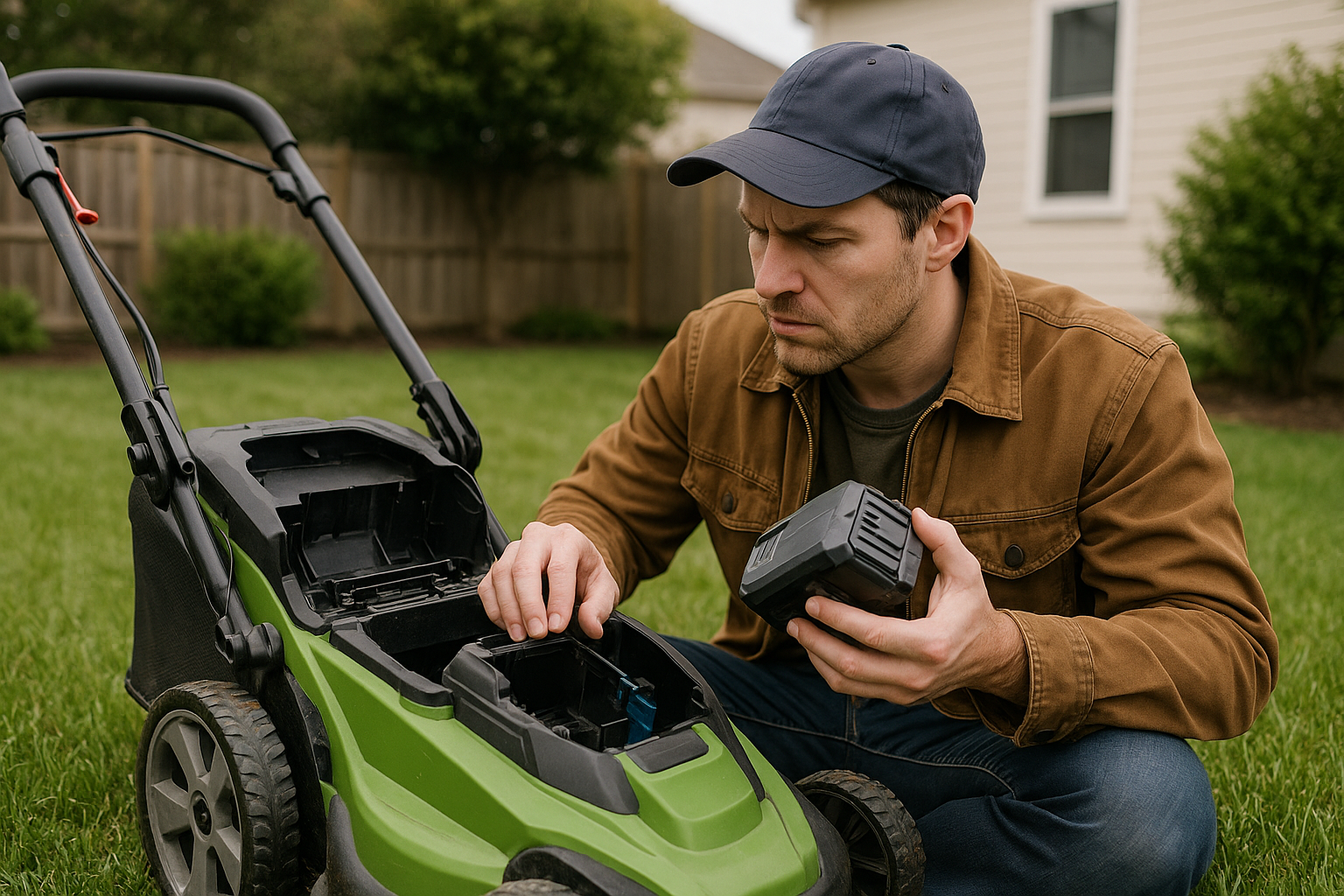
Battery-Powered Lawn Mower Issues (Source: AZParts)
8. Loss of power: faulty governor or clogged exhaust
A sudden loss of power can disrupt your work. This is often caused by governor issues or clogged exhaust systems, both of which need prompt attention.
- Faulty governor: A malfunctioning governor can cause the engine to lose speed or power. Have a professional inspect and repair it if needed.
- Clogged exhaust/muffler: Carbon buildup or debris in the exhaust restricts airflow, reducing power. Clean or replace the muffler to restore proper function.
9. Pull cord issues: too loose or stuck
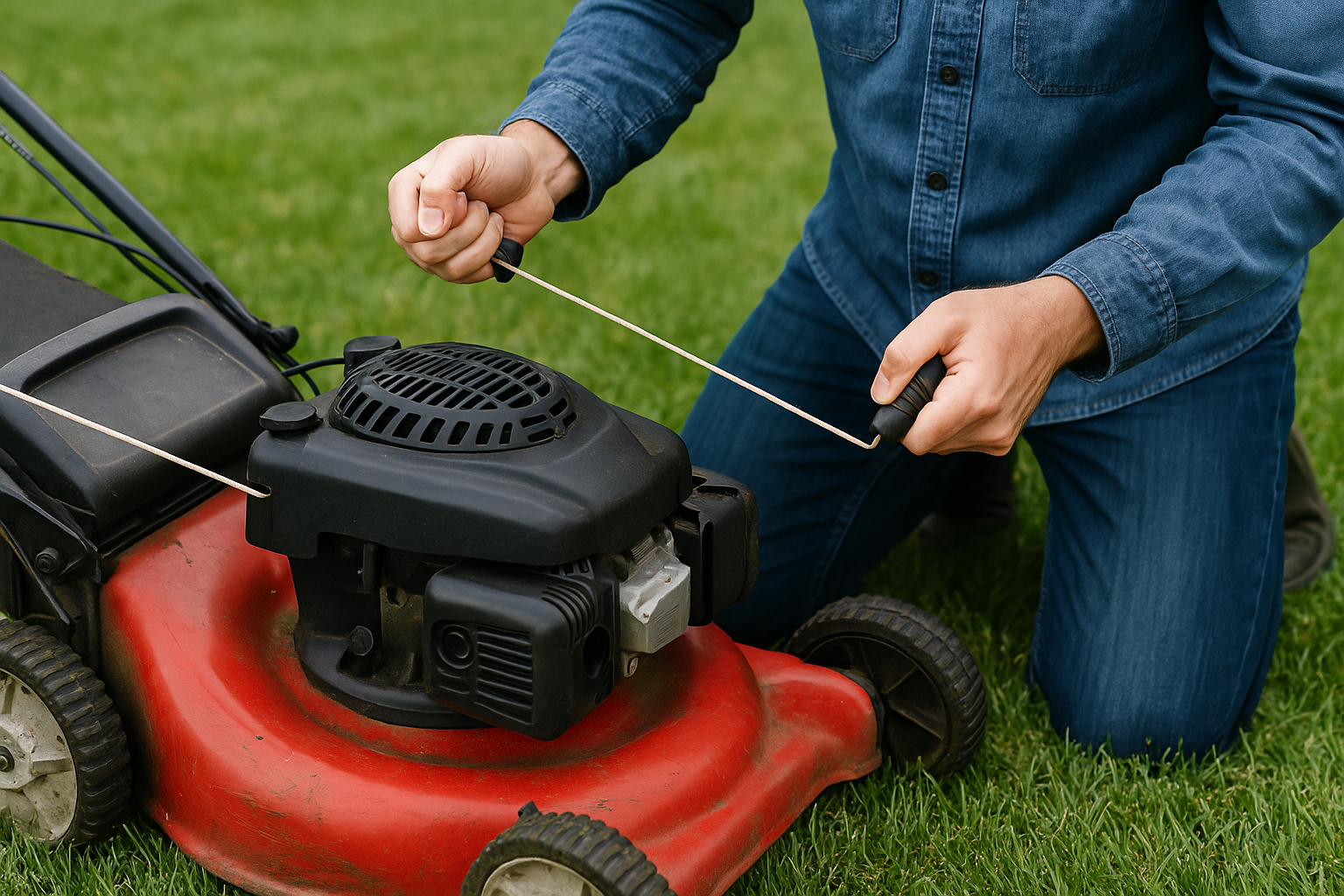
Lawn Mower Troubleshooting related to pull cord (Source: AZParts)
A loose or stuck pull cord can prevent your mower from starting. Understanding the causes helps you fix the problem and keep your mower ready for use.
- Loose pull cord: The recoil spring may be loose or damaged. Adjust or replace the spring to restore proper tension.
- Stuck pull cord: The starter housing might have debris or damage causing the rope to jam. Inspect, clean, and lubricate the starter mechanism as needed.
10. FAQs about Lawn Mower Troubleshooting
10.1. Why does my lawn mower only run for a few seconds then die?
This issue is often caused by a clogged carburetor, dirty fuel filter, or a problem with the fuel supply. It could also be due to a faulty ignition coil or spark plug.
10.2. What is the first thing to check if a lawn mower won't start?
The first thing to check is whether there is fuel in the tank and if the spark plug is clean and properly connected. Also, ensure the safety switch is engaged and the air filter is not clogged.
10.3. How do I know if my lawn mower fuel filter is clogged?
A clogged fuel filter can cause the engine to run poorly or not start at all. Symptoms include sputtering, loss of power, or the engine dying shortly after starting. You may also notice reduced fuel flow when the filter is removed for inspection.
Regular lawn mower maintenance and timely replacement are essential to keep your mower running smoothly and efficiently. Whether it’s fuel pump, gasket, or the carburetor, quality parts make all the difference. At AZParts, you can find reliable, genuine lawn mower parts that help prevent common problems and extend the life of your mower. Always inspect your mower’s components regularly and trust AZParts for replacements to ensure a clean, dependable cut every time.
Contact Information:
8 The Green, Ste A, Dover, Delaware 19901-3618, United States
Lawn Mower
- 1. Lawn Mower Won’t Start
- 2. Lawn Mower Starts Then Stops
- 3. Lawn Mower Vibrates Too Much
- 4. Lawn Mower Cuts Unevenly or Poorly
- 5. Lawn Mower Is Smoking
- 6. Lawn Mower Starter Rope Won’t Pull
- 7. Battery-Powered Lawn Mower Problems
- 8. Loss of power: faulty governor or clogged exhaust
- 9. Pull cord issues: too loose or stuck
- 10. FAQs about Lawn Mower Troubleshooting
Further Reading
Further Reading





